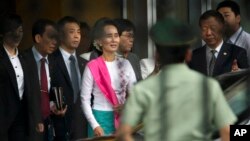Myanmar opposition leader Aung San Suu Kyi, making her first visit to China this week, is expected to meet with Communist Party leaders including President Xi Jinping. China’s tightly controlled state media has released very few details about the visit other than the dates, but that has not stopped other wesbites from reporting about her trip and stirring up discussion on social media.
Although there were no state media reports confirming Aung San Suu Kyi’s arrival, anticipation and interest in the visit is already exceeding the low-key profile the Communist Party apparently intended for the trip.
One online news website posted a large photo gallery of Myanmar’s opposition leader and even created a special page for the well-known democracy leader and Nobel laureate.
The gallery documented her years of being held under house arrest. Public comments were allowed briefly on some stories, but later were removed.
Some readers praised Aung San Suu Kyi as woman worthy of respect. One user on the news portal Wang Yi asked “When will we ever have someone like her?”
Others lobbed crude comments about her advancing age. Others targeted her father’s past ties with Japan.
According to China Digital Times, government censors ordered news media to file no reports about the visit. Some websites, however, appeared to be ignoring that directive.
The visit comes at a crucial time for Myanmar-China relations. Fighting between Myanmar’s military and ethnic rebels has been going on for months and at times has spilled across the border into China. Stray bombs from the fighting have landed in Chinese territory several times; one blast killed five Chinese farmers.
Myanmar will soon hold general elections that some believe could result in expanded power and influence for Aung San Suu Kyi and her National League for Democracy. Sun Yun, a China analyst with the Washington-based Stimson Center, said the upcoming elections were a key reason for the visit.
If the National League for Democracy did well, that could make Aung San Suu Kyi an influential political leader in Myanmar, Sun added.
“And China has important national interests in the country. So, it would be wrong for China not to try to initiate this relationship or establish contact with Aung San Suu Kyi at this particular time,” she said.
Sun said the trip could help to answer questions both in Myanmar and abroad about Aung San Suu Kyi’s ability to lead the country. It could also help boost her foreign-policy credentials.
“She has visited most of the Western countries, including the United States, the U.K., Japan and South Korea. So she has visited almost all of the most important countries in the world and China is not on the list,” said Sun.
Fudan University professor Ren Xiao said China needed to strengthen ties with both ruling and opposition parties in Myanmar because that is something that could easily change when elections were involved. But, he added that didn’t mean that ties with the ruling party were waning.
Ren said that “mutual understanding between both sides [China and Myanmar’s opposition] is lacking, and that includes the National League for Democracy’s understanding of China. That’s why boosting communication and understanding is important for both sides.”
The trip is unlikely to quickly resolve the two sides' deep differences and troubled history. In the past, China was a key supporter of Myanmar’s military junta - the ruling body that long opposed Aung San Suu Kyi, kept her under house arrest and long thwarted the country’s pro-democracy movement.
How she may address such thorny issues with China's leaders remains unclear.
Rights activists in and outside of China have seized on the visit as an opportunity to call once again for the release of Liu Xiaobo, the Chinese Nobel laureate who is currently serving a 11-year prison sentence for subversion.
Liu was sentenced in 2009 for promoting a petition that called for an end to one-party rule.
Asked Wednesday how Beijing might respond if Aung San Suu Kyi made any comments about her fellow laureate during the visit, China's Foreign Ministry says there is no reason to alter the judgment in Liu’s case.
